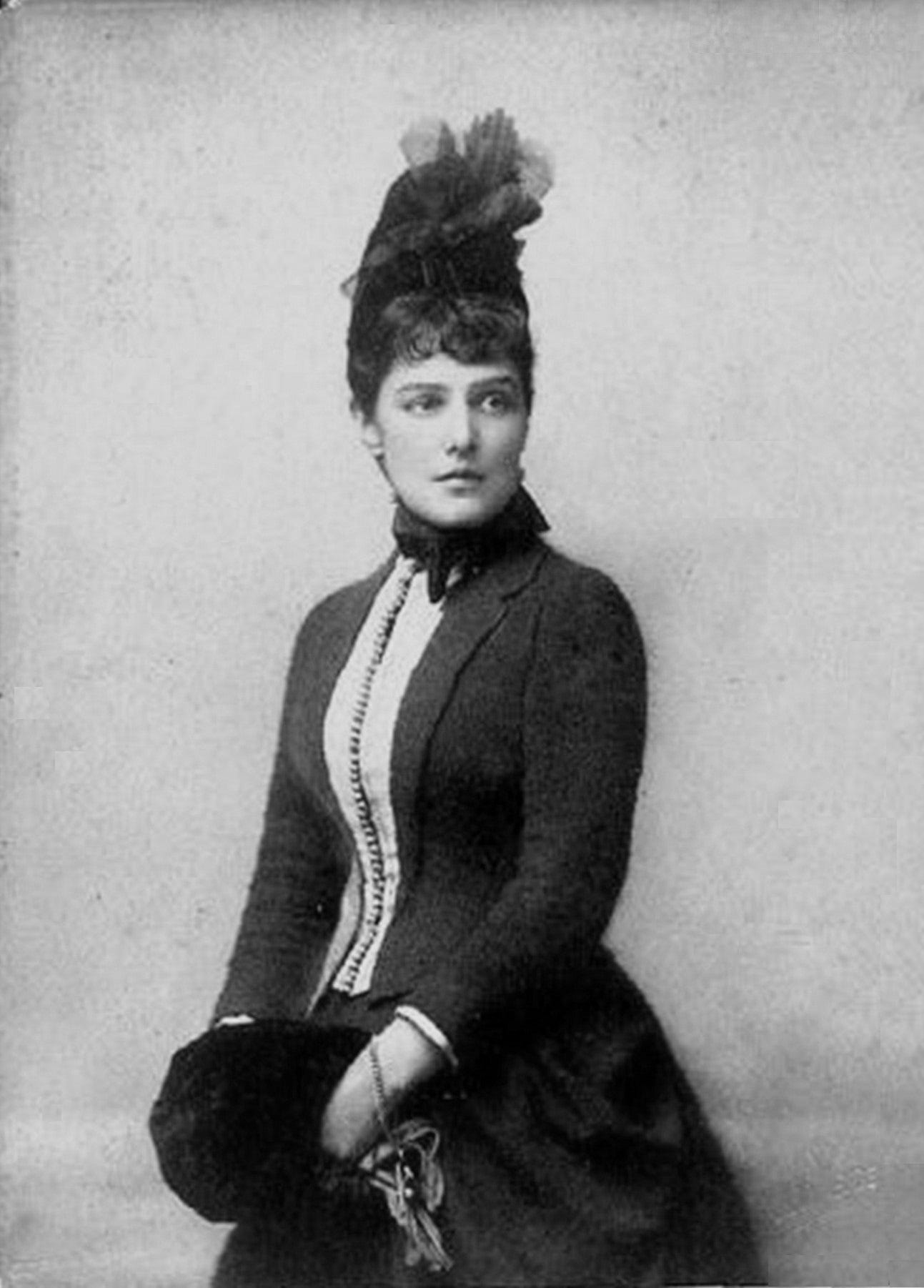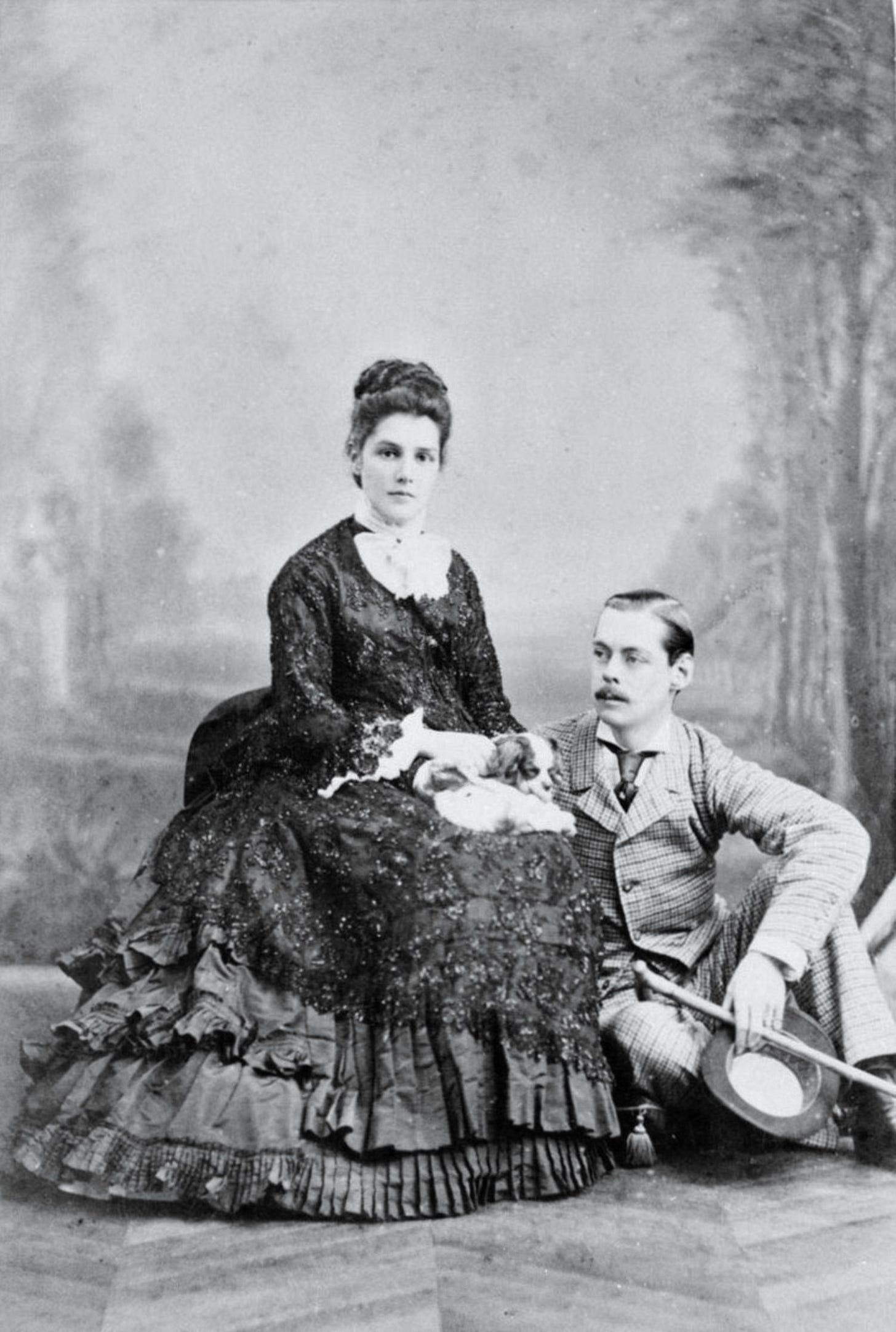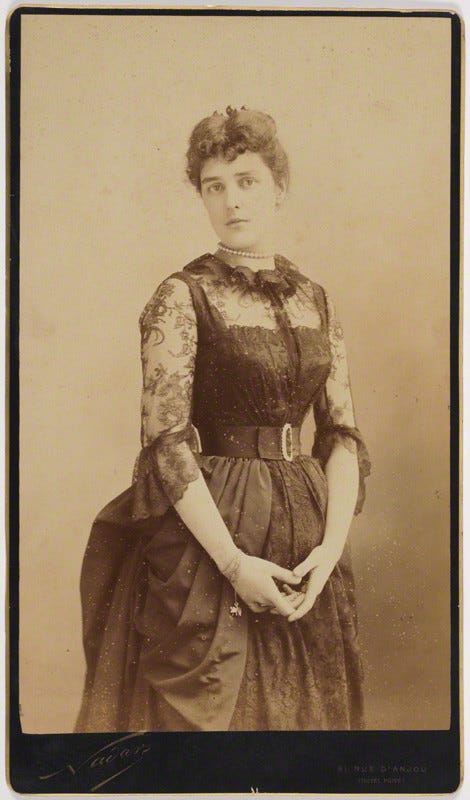“My mother always seemed to me like a fairy princess: a radiant being possessed of limitless riches and power. She shone for me like the evening star. I loved her dearly.”
-Winston Churchill
Like so many society women in the gilded age, Jeanette “Jennie” Jerome was a wealthy American heiress who was brought to Europe to find a titled husband, and a level of prestige that would never have be afforded to her had she remained in America. Jennie arguably took things a step further however as she became the mother of the great Winston Churchill and rose not just to the ranks of the aristocracy, but became great friends with the Prince and Princess of Wales, the later Edward VII and Queen Alexandra. Jennie was a trailblazer and was without a doubt one of the most influential women of her time.
Jennie was born in Brooklyn in 1854 to her parents, Leonard and Clarissa “Clara” Jerome. Her father was somewhat of a character and lived large. In fact, when he was trying to convince Clara to marry him, he pretended to be falling off of Niagara Falls until Clara finally agreed to marry him. He also lived in a big way when it came to finances, and he was always either in a very high high, or a rather low financial low. Although Jennie was considered his favorite daughter and was very close to her father, his mother could no longer put up with his philandering and wild ways and decided after his 1867 scandal, to move her three daughters to Paris.
In Paris, they found themselves at the court of Napoleon III and Empress Eugenie who took a liking to Jennie’s older sister (Jennie was not out in society yet). Because of this, the Jerome girls grew in popularity, charm and had wonderful fashion which aided them when the relocated to England following the 1870 German invasion of France. Once in England, the four Jerome women again fell in with the upper class and Jennie even fell in with the Prince and Princess of Wales (Later Edward VII and Queen Alexandra), whom she remained close to for the rest of her life. She did carry out an affair with the Prince of Wales for a time, but it was actually the Prince of Wales that first introduced the now beautiful and buxom Jennie to her future husband, Lord Randolph Churchill, the third son of the Duke of Marlborough.
Jennie and Randolph fell instantly in love and were engaged after only three days of knowing one another. Jennie reportedly told Randolph that they could have a happy marriage as long as he let her “do what she wanted” which apparently did not put Randolph off. Although their marriage was delayed because of family squabbles over the marriage settlement (and I am sure some disappointment on her mother’s part because Randolph, being a third son, was not likely to inherit the dukedom) Jennie and Randolph held firm and were finally married in April 1874. Their first son Winston arrived in November of that same year (read into that what you will!) And his brother Jack joined the family six years later. Jennie spent much of her early marriage at Blenheim Palace with the Spencer-Churchill family.
After Winston was born, there was a definite distancing that began to happen between Lord and Lady Randolph and it was in this period that they both began to take many lovers. Though fairly open infidelity was rife throughout their marriage, they still loved one another and Jennie was Randolph’s biggest supporter and campaigner in his political career. Jennie had the charm to work the crowds when they campaigned, she knew who to talk to and how to talk to them, and she was a great speaker who gave Randolph much of the confidence he needed to excel in the political world. She, along with her husband and others was also a founding member of the Primrose League society during this period of her life, and was known to be both a formidable and colorful figure in both the British political scene, and in British society.
Lord Randolph is thought to have contracted syphilis at some point in his life and began to show some signs of the tertiary stage in the 1890’s. He became increasingly weak and “mad”, being extremely difficult to deal with, but Jennie was right there at his side. She took him on partial world tour of travels before he died, and it was reported that the action she took in caring for Lord Randolph at the end of his life were “heroic.” Jennie had been her husbands chief supporter, political driver and great love (although there were a few lovers thrown into the mix) but now, it was time for a new chapter.
In the period after Randolphs death, Jennie stayed as active as ever. She maintained her close friendships and influence in high society, including her close and relaxed friendship with the Prince and Princess of Wales. It was well known how much both the Prince and Princess loved being in Jennie’s company and enjoyed her wit and humor, and many very informal letters exchanged between Jennie and the Prince demonstrate just how casual and friendly their relationship was. Jennie was also one of only three former mistresses that Edward VII invited to his coronation, where she sat in special box. It was during this time that Jennie, being the industrious American she was, threw herself into some new work ventures. In 1899 she began the Anglo-Saxon Review, a quarterly magazine publication. Shortly after she was very involved in launching the RFA Maine, a British hospital ship during the Second Beor War in South Africa (it is reported that she herself dressed up as a nurse in a costume she had made..always an outfit to fit the part!) Jennie later also began flipping houses, a thoroughly modern venture by the standards of the time! Undoubtedly her greatest working feat following the death of her husband was the political success of her son Winston. After Lord Randolph’s death, Jennie began to channel her political prowess into her son Winston and he would go on to become one of the greatest statesmen of all time, even long after Jennie passed away.
In 1900 Jennie married George Cornwallis West who was the same age as her son Winston, and although there was a 20 year age gap, the pair was said to be smitten with one another. George apparently doted on Jennie and they were very much in love for most of their marriage. In 1908, Jennie got back to work and wrote The Reminiscences of Lady Randolph Churchill which became a best seller. She also began to write plays that were even performed at the Globe theater. It was during the production of His Borrowed Plumes that her husband started up and affair with the start of the show Mrs. Patricia Campbell, whom he later married after his and Jennie’s 1914 divorce.
Although Jennie was now in her mid 60’s, she again was attracting younger men and she married Montague Phippen Porch who was actually three years younger than Winston. She remained married to him until her death in 1921. Jennie, passed away in perhaps the most “Jennie” way possible, from complications after falling and breaking her ankle in a new pair of sky high heels. Although her passing was extremely sad and felt by many, I have always thought that her death in a way reminds us of how she lived her life, by “doing exactly what she wanted to do.”
*A few more fun facts about Jennie Jerome aka Lady Randolph Churchill
When she was married to Lord Randolph, they lived in the first house in London to have electricity.
She is credited with popularizing the use of place mats at dining tables. No doubt used at all of the fabulous dinner parties she had
Upon Marriage to Lord Randolph, her title became Lady Randolph because Lord Randolph, being the third son of a duke did not have a title of ownership (such as the Marquess of Blandford, which is what Lord Randolph’s oldest brother went by as he was their heir apparent to the Dukedom of Marlborough) but as the son of a duke he was still given the Title of Lord and upon marriage, his wife the title of Lady.
For Further Info…
http://thehistorychicks.com/jennie-jerome-churchill/
That Churchill Woman by Stephanie Barron (although this is a work of historical fiction, this book does an excellent job of capturing who Jennie was)
https://thecrownchronicles.co.uk/history/history-posts/american-heiresses-saved-british-aristocracy-jennie-jerome-lady-randolph-churchill/
The Reminiscences of Lady Randolph Churchill by Lady Randolph Churchill







She was one spicy lady!
I am so glad I found your newsletter. Everything here is my cup of tea!